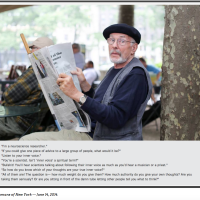In Backfire Step 1: Expose the Injustice–Forensic Fraud being committed by PHPs in Collusion with Corrupt Labs, I used documentary evidence from my own case to show how the PHPs and labs are engaging in undeniable and indefensible forensic fraud. The documents speak for themselves and it does not take a toxicologist or Medical Review Officer to understand that “Updating” a “chain-of-custody”and adding a new ID # to an already positive test breaches all procedural and professional guidelines, medical and societal ethics and state and federal law. It exemplifies how PHPs are blocking the “provision of information” required by most substance of abuse testing programs. Whereas most substance of abuse testing guidelines require not only answerability but “timely” answerability, PHPs use tactics that block and delay such information. These tactics include both refusing to provide the information and dissuading those monitored from requesting it.
In my case it took 5 months to obtain the “litigation packet” (a documentary record generated on any and all “forensic” drug and alcohol testing that records the “chain-of-custody” from initial collection to final analysis. The litigation packet I received in December of 2011 from a test collected by Quest Diagnostics can be seen here: USDTL Litigation Packet.
If you take a look at it you will see that no documentation exists regarding the specimen from when it was collected July 1st, 2011 to when it was reported as positive on July 19th, 2011 by Dr. Luis Sanchez, Medical Director of the Massachusetts PHP, Physician Health services, inc. (PHS). There is, in fact, absolutely no external chain of custody documenting the collection, handling and transport of the specimen. This in itself, according to each and every guideline ever published in the history of forensic testing invalidates the test.
But more importantly, the litigation packet revealed evidence that the reported positive test was not the result of oversight or accident but deliberate and intentional–forensic fraud by fax. Although this laboratory misconduct and fraud is undeniable and indefensible PHPs have no oversight or regulation. Neither do the labs.
Most individuals being tested for substances of abuse by employee assistance programs have a union or some other organization protecting their best interests. In the case of a suspected fraudulent or mishandled test these groups facilitate accountability by helping to obtain the information and requesting justification of actions. No such agencies exist for those being monitored by PHPs. No avenue of complaint against PHPs exist. In addition to no FDA oversight, “forensic” LDTs (unlike clinical LDTs) are exempt from Clinical Laboratory Improvement Amendments of 1988 (CLIA). The only avenue of complaint against a lab utilizing forensic LDTs is through the College of American Pathologists (CAP). As an accreditation agency, however, they are limited in what they can do as a result of an investigation. Whether the complaint involves accidental lab error or intentional fraud the only action CAP can take at the conclusion of an investigation is to threaten the lab with loss of accreditation if the lab does not come into compliance with their “Forensic Drug Testing Checklist.” They can also force the lab to “correct” these tests under threat of loss of accreditation. This is what CAP did in my case which brings us to Backfire Step 3: Reframe: emphasize the injustice, counter reinterpretation.
Drug testing that follows mandated guidelines provides procedural safeguards that protect the donor. .Accountability demands both the provision of information (answerability) and justification for ones actions. both those administering the tests and those performing the tests are held accountable by outside agencies. The system is transparent and when the validity or integrity of a test is questioned the employer and lab must provide the records and documentation.
Why are doctors allowing PHPs to use drug and alcohol testing of unknown validity? We require evidence-base and adherence to professional protocol and ethical guidelines in every other arena but this one. Using the fallacious appeal to authority, however, the impaired physicians movement doctors (FSPHP) convinced regulatory boards that these tests were valid, reliable and necessary. In fact the sensitivity and specificity is unknown so the false-positive rate is unknown. In addition, with no regulation or oversight, positive tests can be the result of deliberate misconduct and, with no agency to sanction those engaging in the misconduct, it can continue unchecked.
It is time we demand better care for our fellow doctors. It is time we debunk the mythology surrounding the required length of stay in rehabilitation facilities that is three-times longer than anyone else. There is nothing unique about being a doctor that warrants this. No evidence base exists. PHPs need to be reformed and rebuilt as programs of institutional justice. The current state of affairs is one of coercion, control and abuse.


















Reblogged this on ' Ace Blog & Share News '.
LikeLike
Reblogged this on Disrupted Physician.
LikeLike
We should have evidence based testing,evaluation and evidence based treatment. Get rid of the 3 month lockdown with the Big Book,continuous meetings,AA and boredom.
LikeLiked by 1 person